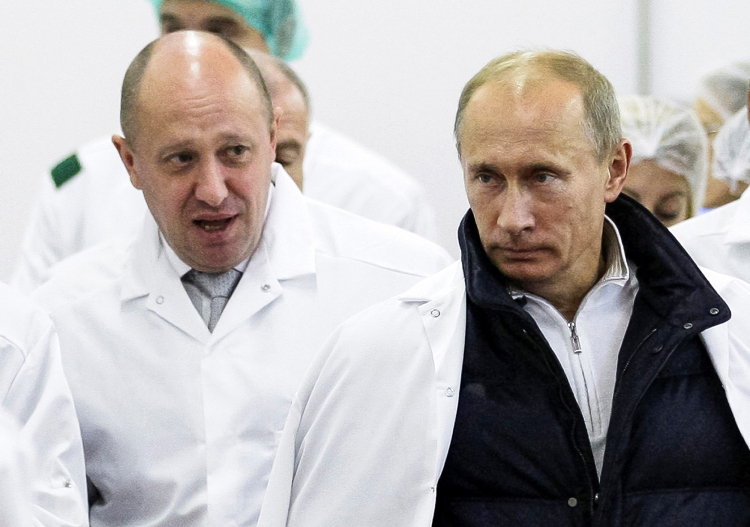An agreement between the Wagner mercenary group and the Russian government averts a civil war for now, but the future is less clear, according to CU Boulder Russia expert and political science professor
Events in Russia’s ongoing war with Ukraine took perhaps their most dramatic turn to date late last week.
On Saturday, members of the 25,000-member Wagner mercenary group—which had been fighting on behalf of Russia in Ukraine—took over a major Russian military base, shot down several Russian aircraft and launched a short-lived coup that threatened to start a civil war.
The two sides quickly approved a deal brokered by Belarusian President Alexander Lukashenko, the terms of which include Wagner forces agreeing to stand down in exchange for immunity and mercenary chief Yevgeny Prigozhin and some of his fighters relocating to nearby Belarus.

Sarah W. Sokhey specializes in comparative politics and political economy with a regional focus on the post-communist countries of Eastern Europe, Russia, and Central Asia.
Sarah Wilson Sokhey, an associate professor of political science at the University of Colorado Boulder who has spent more than 20 years traveling to and studying the politics of Russia and the former Soviet Union, has been monitoring the situation in Russia closely for signs of what might come next. She recently spoke to Have Ya Herd about what the latest developments could mean for Prigozhin, his mercenary fighters, Russian President Vladimir Putin’s grip on power and the ongoing war between Russia and Ukraine.
Question: Prigozhin, the head of the Wagner mercenary army, was once a close ally of President Putin. How surprising is it he and Putin had a major falling out?
Wilson Sokhey: It’s surprising and not surprising, in a way.
So, it’s surprising in that most of us had no idea that this was coming with a particular timing of this. The U.S. government is saying that they did have some advance information that this might be about to occur, but I’m not sure how far in advance they had that information.
It’s not surprising that someone like Prigozhin would turn on Putin and would try to take advantage of the situation—to challenge Putin’s political power. … Given that the war has been going badly, and that he (Prigozhin) is not an entirely predictable person, it’s not shocking that someone like him would do something like this.
Question: Do you have any thoughts on what happens to Prigozhin, who supposedly is now receiving amnesty?
Wilson Sokhey: It probably doesn’t stop there. There are a lot of different scenarios that could play out. Prigozhin has been offered the opportunity to “retire,” in an old kind of Soviet sense, in Belarus, as negotiated by Belarus President Lukashenko.
If he’s smart, he’ll try to get out of Belarus and go somewhere else, but he doesn’t have any good options for where else he could go.
Some people think that Prigozhin could still pose a risk to Putin. He could still possibly have support among the soldiers that he led before. Some people are speculating that there’s every incentive for Putin or for the FSB (the Russian state security service) to try to kill him while he's in Belarus, or maybe for the Belarusian security forces to be involved in that, because Belarus is a close ally of Russia.
So, Prigozhin himself is still very much at risk, and the Russian system is still at risk from having someone who has recently engaged in this attempted coup still very close by.
Question: What happens to Wagner’s mercenary troops that are in in Russia and are deployed against the Ukrainians?
Wilson Sokhey: They’ve also been offered amnesty. So, the official line right now is that they’re not going to be prosecuted for their participation in the coup. They have every incentive as well, however, to try to get out of Russia with whatever options that they have. …
I wouldn’t imagine that the Russian government has any incentive to have those particular soldiers go back to Ukraine and fight, but the Russian government also is running out of (soldiers) and is facing a situation which it has to draft more people. It really needs every soldier it can get if it intends to keep waging this war. So, it’s really unclear.
Question: In the past, Putin has been an expert at spinning things—even when they didn’t necessarily go his way. But given this latest development with the attempted coup by Wagner mercenaries, is there a way for Putin to put a good spin on it?
Wilson Sokhey: He can’t turn it into a good thing, but Putin is certainly trying his hardest to spin it as a situation in which he was very much in control, that he knew what was happening and that it (the coup attempt) was put down quickly. But it’s going to be very challenging for him to avoid any consequences from this in the public eye.
On the front page of (the Russian newspaper) Komsomolskaya Pravda is an interview with a political analyst, saying, “Well, it doesn’t appear that Russian elites were involved in this at all … and it’s just a limited attempt at a coup.”
But there’s really not a scenario in which it doesn’t make the Russian government look grossly incompetent and divided that something like this could happen. And although the Russian people, like all people, are very susceptible to propaganda from the Russian state … they can also be remarkably savvy. And if this is what they see of how the Russian government is functioning, they know that what they don’t see has got to be all the worse.
That doesn’t mean, however, that Putin will immediately be removed from power as a result. But one possibility is that it’s the beginning of the end.
Question: In terms of the ongoing war between Ukraine and Russia, can the Ukrainians potentially use this turmoil to their advantage?
Wilson Sokhey: Absolutely. This is only good for Ukrainians, who are fighting against Russia. It shows that Russia is divided and that the military is falling apart. It provides an opportunity in the short and medium term, and maybe long term as well, for attention to be diverted away from attacks on Ukraine at a time when Ukraine is stepping up its own counteroffensive. …
Ukrainians were watching this very closely—and not only does it boost morale, but the actual ability to fight. So, it’s very clearly good for Ukraine.
Question: In terms of the long-term outlook for the war between Russia and Ukraine, do these recent developments with Wagner potentially change the calculus of the war?
Wilson Sokhey: The calculus changes entirely, really, in that it sends such a powerful signal that the Russian military is doing so badly. But the other critical component of this will be continued, strong support from Western governments and military aid and financial aid to continue fighting the war.
It absolutely changes the calculus of what we think is possible. And it shows that the Russian military is not invincible, which we already knew, but it demonstrates just how bad of a state the Russian military is in.
Question: What are Western governments to make of the current state of affairs in Russia?
Wilson Sokhey: Governments are watching these developments very, very closely. (Secretary of State) Anthony Blinken cancelled travel plans because of the potential coup attempt that was happening to make sure they were monitoring the situation closely.
And I think that what’s key here, is that Western governments will watch closely for opportunities to assist Ukraine most effectively, because what’s happening makes Russia look all the more vulnerable. So, what some Western governments didn’t entirely think was possible before, in defeating Russia in Ukraine … looks more possible now.
Question: Putin has managed to stay in power for about 20 years. Is there anything to suggest he might not be able to survive this politically?
Wilson Sokhey: Yes, but we really don’t know when that political demise would come, exactly. There have been people who have pointed out that this is similar to a failed attempted coup that happened in Russia back in 1917, before the Bolshevik Revolution, which was successful.
In the summer of 1917, there is a general who marches on the Tsar and is trying to bring down the monarchy, but fails. But that was the first step in what’s ultimately going to open up an opportunity for the Bolshevik Revolution to be successful.

Russian oligarch Yevgeny Prigozhin (left) is a leader of a mercenary group and previous confidant of Russian President Vladimir Putin (right).
So, one possible scenario is that we see something like that—that this attempt was not successful, but it opens the opportunity and creates cracks and weaknesses in the system that lead to regime change, perhaps, or the fall of Putin.
Question: If that happens, is there a sense of who Putin’s replacement might be?
Wilson Sokhey: One possibility is that it’s someone from the security services or from the military. And one possibility is that we see it be someone who, like Putin himself when he first came to power, is a relatively unknown name for the everyday person. So, it’s not someone on our radar right now, but someone who is high up in the ranks.
But the critical thing to remember is that the person who takes over from Putin may not be better than Putin. It’s not a quick fix if Putin dies tomorrow or if he’s deposed from power. With the system that’s being perpetuated in Russia, and the Russian government right now, it may get worse before it gets better.
Question: Is there anything else that people should be mindful of now, particularly regarding the ongoing conflict between Ukraine and Russia?
Wilson Sokhey: I just think it’s so important to continue to keep Ukraine in the news and to remember that the war is happening. And that it actually could get worse this winter, especially because Russia has attacked infrastructure in Ukraine. …
That’s going to be a very challenging situation for Ukraine, and it needs as much support as ever from the West.



